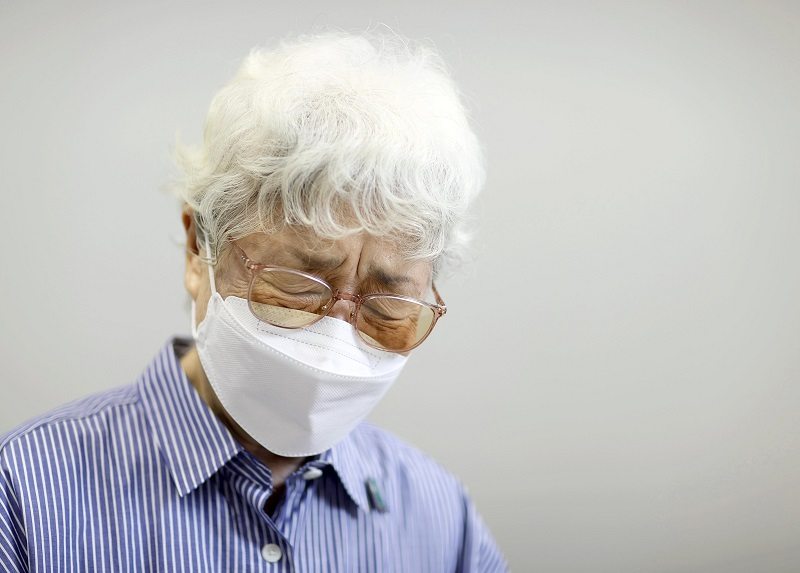Japan mom, 86, wants to see daughter abducted by N. Korea ‘at least once’

Sakie Yokota talks during an interview with The Yomiuri Shimbun in Kawasaki on Aug 24.
16:01 JST, September 3, 2022
Sept. 17 marks 20 years since the first Japan-North Korea summit meeting, during which Pyongyang admitted to abducting Japanese citizens.
For Sakie Yokota, the meeting marked the start of a new struggle for the return of her daughter Megumi, who was abducted at age 13.
“She’s not a child who would die easily,” said Sakie, 86, during an interview with The Yomiuri Shimbun in late August. “I’ll do everything in my power [to get her back].”
Megumi went missing in Niigata City on Nov. 15, 1977, while on her way home from school after finishing badminton club practice. At the time, she was a first-year junior high school student.
“I went crazy and was crying all the time,” Sakie recalled. “I was always thinking ‘I’d rather be dead,’ or ‘I’d feel so much better if I just died now.’ I felt as though I was in hell. The Niigata scenery was painful to look at. It still is, even now.”
In January 1997, testimony from a former North Korean agent raised suspicions that Megumi may have been abducted.
In March that year, the Yokotas and others affected by abductions formed the Association of Families of Victims Kidnapped by North Korea (AFVKN). Sakie’s husband, Shigeru, served as the group’s first representative. The couple subsequently traveled around the country appealing for the release of the kidnapping victims.
“Every day felt like a race, and I was running,” Sakie said. “I’m shy and hate being in public. But I think any parent would do the same if something happened to a precious child. You can’t just keep quiet.”
At a 2002 summit between then Prime Minister Junichiro Koizumi and then North Korean leader Kim Jong Il, Pyongyang claimed that five abductees were alive, while eight others, including Megumi, had died.
During a press conference, Shigeru choked up with emotion, prompting Sakie to take the microphone and say, “We’ll keep fighting in the belief that [our daughter] is still alive.
“I was desperate, thinking that this shouldn’t be the end of it, and that I had to speak up for Megumi. I was so caught up in the situation that I don’t even remember what I said. That day was the beginning of a new struggle.”
On Oct. 15, 2002, about a month after the summit, five abductees returned to Japan from North Korea. Sakie and Shigeru were among those to greet them at Haneda Airport.
“Talking with other family members I was saying that Megumi was definitely going to come down the ramp, too. But there was no way she was there. I was crying as I gazed at the five survivors, thanking them for returning,” Sakie said.
In November 2004, DNA tests showed that cremated remains claimed by North Korea to be those of Megumi were fake.
“North Korea is a worse country than you think, and what they say is full of lies,” Sakie said. “When I first heard that Megumi had died and was shown her remains, I firmly believed it was a complete lie. As her parents, we knew she wasn’t the kind of child who would die easily.”
In March 2014, Sakie met Megumi’s daughter, Kim Eun-gyong, and Kim’s daughter — the Yokotas’ great-granddaughter — in Mongolia. At the time, Sakie was 78 and Shigeru was 81. The couple made the decision to travel to meet their relatives because they thought it might become increasingly difficult as they got older.
“That is my happiest memory of the last 20 years,” Sakie said. “My husband was delighted, too. I didn’t ask [Eun-gyong] if Megumi was safe. But, when we parted, I said to her, ‘I’ll do my best until you all can come back to Japan together; there’s hope,’ and she cried and nodded.”
Shigeru died in June 2020, age 87. In December last year, the second head of AFVKN, Shigeo Iizuka — the older brother of abductee Yaeko Taguchi — died at 83. Megumi’s younger brother Takuya, 54, now serves as the group’s leader.
“Even today, I talk to a photograph [of Shigeru],” Sakie said. “Supported by many people, my husband did things that normally can’t be done. I told [my son] Takuya, ‘You have a job, don’t [become the group’s head].’ But he didn’t listen, maybe because he saw that I was getting weaker. He said, ‘It’ll all be over if you stop.’ Why do we have to pass this matter on to our children when as parents we’ve already worked hard [on this issue] for more than four decades?”
Sakie explained that over the course of several years, her voice has gradually become hoarse, making it difficult for her to speak at lectures and other events. Her legs are losing strength and she recently fell near her home.
“I may not be around next year,” she said. “But, like my husband, I’ll do all I can before I go. Even if Megumi doesn’t come back to Japan, I want to see her at least once. I want the Japanese government to somehow open the way.”




